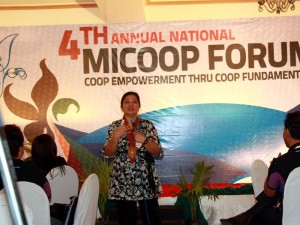
ILOILO CITY – Former Cooperative Development Authority (CDA) chairperson Lecira “Bing” Juarez congratulated the Microfinance Innovations in Cooperatives (MICOOP) as a “shining example of self-regulation in cooperatives, truly living the cooperative value of self-management and discipline in the cooperative sector.
MICOOP is the microfinance innovation program of the National Confederation of Cooperatives (NATCCO), composed of 452 member cooperatives nationwide with combined individual memberships of 1.6 million individuals. Under the MICOOP Program, a cooperative and NATCCO co-invest to put up microfinance branches in rural areas of high poverty incidence.
“MICOOP started right. You have coaches that provide guidance and technical expertise plus proven and tested practices that are systematic and not just “oido.” You have observed, recorded and spread out the proven “best practices.” And because of this, self-regulation has become a reality!” said Ms. Juarez, who has held leadership positions in various cooperatives and government agencies.
“There are 18,000 registered cooperatives and regulating all of them is going to be a challenge or downright impossible given the CDA’s meager resources. But with self-regulation, the CDA will have the best partnership with federations and unions, in shaping up cooperatives, thus lightening the burden of CDA in doing regulation!” she added.
“What makes cooperatives unique are its values like mutual responsibility, self-management and discipline, self-help, solidarity, equity, democracy, and equity.”
The MICOOP Program has opened 75 branches all over the country since it began in 2007. And the partner cooperative has the option to buy out NATCCO of its shares. The MICOOP program now co-manages 51 branches, providing consultancy, monitoring, and mentoring to the branch staff.
“Cooperatives should self-regulate through cooperative federations and unions, this way we can best articulate the principle of subsidiarity” she said.
“Cooperatives have an inherent advantage because of its well-founded ethical values : honesty, openness, social responsibility and caring for others. This was first practiced by co-ops in the 18th century, when ordinary enterprises aimed for only one bottom-line . . . profits!” she added.
She also lauded the United Nations for declaring 2012 as the International Year of Cooperatives. Juarez was invited by the United Nations in its Expert Group Meeting (EGM) last May 3-6, 2011 in Mongolia conveyed the very significant theme of the celebration: ‘Cooperative Enterprises Build a Better World.’ “The UN implies that the co-operative is the best form of enterprise because its members and workers are also its owners,” she added.
“Today, it is hip for big corporations to try to position themselves in the market by having ‘social responsibility.’ Now, they also have F.A.T. or ‘Fairness, Accountability and Transparency.’ But even before corporations did that, cooperatives were already into it 150 years ago. In the 19th century – we already had Honesty, Openness, Social Responsibility, and Caring for Others. The corporations are copying us. When the big enterprises only had one bottomline which was profit, we had a triple bottom line which are prosperity, planet [or environment] and people,” she said.
The MICOOP Group is currently holding its annual General Assembly at the Sarabia Manor Hotel. 125 branch managers and cooperative leaders from all over the country are participating by sharing best practices to ensure the sustainability of branch operations and deliver microfinance services to the countryside.

